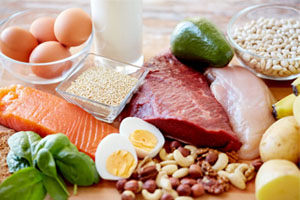Discover the key components of a balanced diet for improved well-being Explore essential nutrients, debunk myths, and make informed dietary choices
What is a balanced diet? A balanced diet is the cornerstone of good health and well-being. It's not just about eating in moderation; it's about ensuring that you get the right nutrients your body needs to function optimally. In this article, we will explore the key elements of a balanced diet, dispel common misconceptions, and provide you with the knowledge to make informed dietary choices. Whether you're looking to maintain a healthy weight, boost your energy levels, or support your long-term health, understanding the components of a balanced diet is essential.

The Importance of a Balanced Diet
Having a balanced diet is essential for maintaining good health and overall well-being. It provides your body with the right mix of nutrients, vitamins, and minerals that are necessary for various bodily functions. A balanced diet is not about strict limitations or depriving yourself of your favorite foods; instead, it's about making informed and healthy choices.
Why Is a Balanced Diet Crucial?
A balanced diet is crucial for several reasons:
- Optimal Nutrition: It ensures that you get the necessary nutrients, such as proteins, carbohydrates, healthy fats, vitamins, and minerals, in the right proportions.
- Energy: A balanced diet provides the energy needed for daily activities, work, and exercise.
- Weight Management: It helps in achieving and maintaining a healthy weight, reducing the risk of obesity and related health issues.
- Disease Prevention: A balanced diet lowers the risk of chronic diseases like heart disease, diabetes, and certain types of cancer.
- Mental Health: Proper nutrition also supports mental health and can contribute to improved mood and cognitive function.
- Growth and Development: For children and adolescents, a balanced diet is vital for proper growth and development.
What Are the Benefits of a Balanced Diet?
Adopting a balanced diet offers a wide range of benefits:
- Improved Overall Health: It enhances your general health, making you feel better and more energetic.
- Stronger Immune System: A balanced diet strengthens your immune system, making you less susceptible to illnesses.
- Healthy Skin and Hair: The nutrients in a balanced diet can lead to healthier skin and hair.
- Better Digestion: It supports good digestion and helps prevent digestive issues.
- Longevity: Maintaining a balanced diet can contribute to a longer, healthier life.
- Weight Control: It aids in maintaining a healthy weight and reducing the risk of obesity.
By understanding the importance of a balanced diet, you can make informed choices about the foods you consume and improve your overall quality of life.
Essential Nutrients in a Balanced Diet
For a diet to be considered balanced, it should include a variety of essential nutrients that are vital for the body's proper functioning. These nutrients can be divided into several categories:
1. Proteins
Proteins are the building blocks of life and are necessary for the growth and repair of tissues. They are essential for the production of enzymes, hormones, and other molecules in the body. Good sources of protein include lean meats, poultry, fish, eggs, dairy products, legumes, and nuts.
2. Carbohydrates
Carbohydrates are the body's primary source of energy. Complex carbohydrates, found in foods like whole grains, fruits, and vegetables, provide sustained energy, while simple carbohydrates in sugar and sweets offer quick bursts of energy.
3. Healthy Fats
Healthy fats, such as monounsaturated and polyunsaturated fats, are essential for brain health and the absorption of fat-soluble vitamins. Sources of healthy fats include avocados, olive oil, nuts, and fatty fish like salmon and mackerel.
4. Vitamins
Vitamins are organic compounds that the body needs in small amounts for various functions. They play a crucial role in immune support, bone health, and other bodily processes. For example, vitamin C is found in citrus fruits, while vitamin D is synthesized when your skin is exposed to sunlight.
5. Minerals
Minerals, such as calcium, iron, and potassium, are essential for maintaining strong bones, transporting oxygen in the blood, and regulating blood pressure. Dairy products, lean meats, and leafy greens are good sources of these minerals.
6. Fiber
Fiber aids in digestion, helps maintain healthy cholesterol levels, and promotes a feeling of fullness. It is commonly found in fruits, vegetables, whole grains, and legumes.
7. Water
Water is a fundamental nutrient that makes up a significant portion of the body. Staying hydrated is essential for overall health, as it regulates body temperature, aids in digestion, and facilitates the transport of nutrients.
By including these essential nutrients in your diet, you can maintain a balanced and healthy eating plan that supports your overall well-being and vitality.
The 7 Key Elements of a Balanced Diet
A balanced diet is a crucial aspect of maintaining good health and well-being. It should encompass a variety of key elements that provide essential nutrients and support various bodily functions. Here are the seven key elements:
1. Proteins
Proteins are the building blocks of the body. They are essential for the growth, repair, and maintenance of tissues. Sources of protein include lean meats, poultry, fish, eggs, dairy products, legumes, and nuts.
2. Carbohydrates
Carbohydrates are the body's primary energy source. Complex carbohydrates, found in foods like whole grains, fruits, and vegetables, provide sustained energy, while simple carbohydrates offer quick bursts of energy from foods like sugar and sweets.
3. Healthy Fats
Healthy fats, such as monounsaturated and polyunsaturated fats, are vital for brain health, hormone production, and the absorption of fat-soluble vitamins. They are found in avocados, olive oil, nuts, and fatty fish like salmon.
4. Vitamins
Vitamins are essential for various bodily functions, such as immune support and bone health. They are present in a range of foods. For instance, vitamin C is abundant in citrus fruits, and vitamin D is synthesized when your skin is exposed to sunlight.
5. Minerals
Minerals, including calcium, iron, and potassium, play crucial roles in maintaining strong bones, oxygen transport in the blood, and regulating blood pressure. These minerals are found in dairy products, lean meats, and leafy greens.
6. Fiber
Fiber supports digestion, helps maintain healthy cholesterol levels, and provides a feeling of fullness. Foods rich in fiber include fruits, vegetables, whole grains, and legumes.
7. Water
Water is fundamental for life and makes up a significant portion of the body. Staying hydrated is essential for maintaining body temperature, aiding digestion, and facilitating nutrient transport.
By incorporating these seven key elements into your diet, you can achieve a well-rounded, balanced eating plan that promotes optimal health and well-being.
Common Misconceptions About Balanced Diets
While understanding the importance of a balanced diet is vital, there are several misconceptions that can lead to confusion. Let's address these common myths:
1. All Fats Are Unhealthy
One of the prevailing myths is that all fats are bad for you. In reality, there are healthy fats, such as monounsaturated and polyunsaturated fats, which are essential for overall health. These fats can be found in foods like avocados, olive oil, and fatty fish.
2. Carbohydrates Lead to Weight Gain
Carbohydrates are often blamed for weight gain. The truth is that not all carbohydrates are created equal. Whole grains, fruits, and vegetables provide essential nutrients and fiber, which can aid in weight management when consumed in moderation.
3. Skipping Meals Helps with Weight Loss
Some people believe that skipping meals, especially breakfast, is an effective way to lose weight. In reality, skipping meals can lead to overeating later in the day and may negatively impact metabolism and energy levels.
4. All Proteins Are Equal
Another misconception is that all proteins are equal. While protein is crucial, not all sources are healthy. Lean proteins from sources like poultry, fish, legumes, and nuts are preferable to processed or fatty meats.
5. You Can Supplement a Poor Diet
Many think that they can compensate for an unhealthy diet by taking supplements. While supplements have their place, they cannot replace the benefits of a well-balanced diet from whole foods. They should be used to complement, not replace, a healthy diet.
6. More Protein Equals Better Muscle Gain
There's a misconception that consuming excessive protein will lead to significant muscle gain. However, the body can only utilize a certain amount of protein, and excessive consumption can strain the kidneys and lead to other health issues.
7. A Balanced Diet Is Bland and Boring
Some believe that a balanced diet means giving up flavor and enjoyment. This is far from the truth. A balanced diet can include a wide variety of delicious and nutritious foods. It's all about making the right choices and finding balance.
By dispelling these common misconceptions, you can make more informed choices about your diet, leading to better health and overall well-being.
FAQs About Balanced Diets
Q1: Are all fats bad for you?
A1: No, not all fats are bad. Some fats, like monounsaturated and polyunsaturated fats found in foods such as avocados, olive oil, and fatty fish, are essential for overall health.
Q2: Do carbohydrates lead to weight gain?
A2: Carbohydrates alone do not lead to weight gain. It depends on the type and quantity of carbohydrates consumed. Whole grains, fruits, and vegetables provide essential nutrients and can support weight management when eaten in moderation.
Q3: Is it effective to skip meals for weight loss?
A3: Skipping meals is not an effective strategy for weight loss. It can lead to overeating later in the day and negatively impact metabolism and energy levels.
Q4: Can supplements replace a balanced diet?
A4: Supplements are not a replacement for a balanced diet. While they can be beneficial, they should complement, not replace, a healthy diet based on whole foods.
Q5: Does excessive protein intake lead to better muscle gain?
A5: No, excessive protein intake does not necessarily lead to better muscle gain. The body has a limit on how much protein it can use, and excessive consumption can strain the kidneys and lead to health issues.










